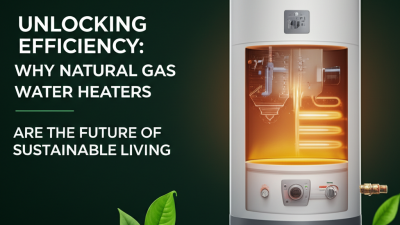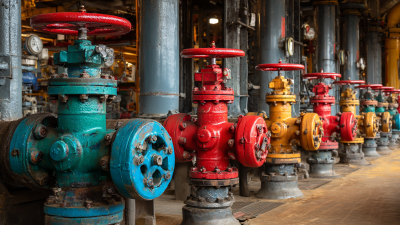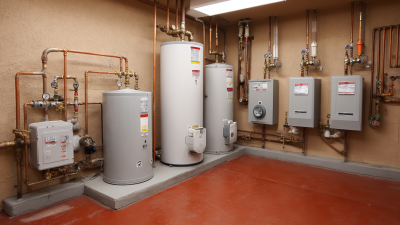

As the world shifts towards sustainable living solutions, the role of the natural gas water heater emerges as a pivotal element in enhancing energy efficiency and reducing carbon footprints. According to the U.S. Department of Energy, natural gas water heaters are not only faster in heating water than their electric counterparts but also demonstrate a significant reduction in greenhouse gas emissions, often cited as 24% less than electric models. Furthermore, the American Gas Association reports that natural gas water heaters can save homeowners approximately $350 annually on energy bills due to their lower operational costs and higher efficiency ratings. With advancements in technology leading to smarter and more efficient models, embracing the natural gas water heater as a primary choice is undoubtedly a forward-thinking step towards a more sustainable future.

Natural gas water heaters are gaining recognition as a pivotal component in promoting sustainable living. Their environmental benefits primarily stem from their reduced greenhouse gas emissions compared to traditional electric heaters. By utilizing natural gas, these systems can achieve efficiency levels that significantly lower carbon footprints, thus contributing to a reduction in overall environmental impact. This transition to cleaner energy sources aligns with global efforts to combat climate change and promote responsible energy consumption.
Moreover, natural gas water heaters offer superior efficiency and faster heating capabilities. They not only heat water more quickly than electric models but also use energy more effectively, reducing wasted resources. This efficiency translates into lower energy bills for consumers, encouraging a shift towards more sustainable practices in everyday life. As households become more aware of their energy usage and its environmental implications, switching to natural gas water heaters represents a practical and impactful choice in the pursuit of a greener future.
When comparing the cost efficiency of natural gas water heaters to electric models, several factors come into play. Firstly, natural gas is often cheaper than electricity, leading to lower monthly utility bills for homeowners. The price gap can be significant, as natural gas prices tend to remain stable or decrease over time, while electricity rates can fluctuate dramatically based on demand and other market conditions. This long-term cost advantage makes natural gas water heaters an appealing option for those looking to reduce their overall energy expenses.
Moreover, natural gas water heaters generally have a faster recovery rate, meaning they heat water more quickly than electric models. This efficiency not only results in reduced wait times for hot water but also contributes to energy savings, as appliances can operate more effectively during peak usage periods. Additionally, many natural gas models come with improved insulation and high-efficiency designs, further enhancing their cost savings potential. By investing in a natural gas water heater, homeowners can enjoy both immediate financial benefits and long-term sustainability, positioning themselves wisely for the future.
When considering energy efficiency in residential water heating, the choice between natural gas and electric water heaters becomes increasingly important. Natural gas water heaters typically outperform their electric counterparts in terms of energy efficiency. They provide faster heating times, which means less energy waste while waiting for hot water. Additionally, natural gas is often more cost-effective in areas where it is readily available, leading to lower utility bills for households.
Moreover, the environmental impact of natural gas water heaters is often more favorable than that of electric models, particularly when the electricity source relies heavily on fossil fuels. Natural gas burns cleaner and emits fewer greenhouse gases during operation compared to electricity generated from coal or other non-renewable resources. As concerns over climate change and energy sustainability continue to rise, the transition to natural gas water heaters presents a viable path for eco-conscious homeowners aiming to reduce their carbon footprint while enjoying the benefits of efficient heating technology.
Natural gas water heaters play a significant role in reducing carbon footprint metrics by offering a cleaner and more efficient alternative to traditional electric systems. Unlike electric heaters that often rely on fossil fuels for power generation, natural gas heaters emit lower levels of carbon dioxide during operation. This is crucial for households and businesses aiming to minimize their environmental impact. By utilizing natural gas, which burns cleaner than oil or coal, these heaters contribute to a decrease in overall greenhouse gas emissions.
Furthermore, advances in technology have led to the creation of high-efficiency natural gas water heaters that optimize energy usage. These units are designed to use significantly less energy to heat water than their less efficient counterparts. The efficiency gains not only result in lower utility bills for consumers but also play an essential role in the broader context of sustainability. By adopting these technologies, we can help mitigate climate change while enjoying the comfort and convenience of modern heating solutions. This dual benefit highlights the importance of natural gas water heaters in future sustainable living practices.
Recent technological advancements have revolutionized natural gas water heaters, making them an increasingly compelling choice for eco-conscious homeowners. Innovations such as condensing technology maximize energy efficiency by capturing and reusing heat that would otherwise escape, significantly reducing fuel consumption and lowering utility bills. Additionally, smart technologies enable users to monitor and control water heater systems remotely, optimizing performance and efficiency while minimizing waste.
Furthermore, manufacturers are focusing on integrating advanced materials and designs that enhance durability and reduce emissions. New insulation techniques improve heat retention, leading to quicker heating times and less energy usage overall. As these systems become more sophisticated, they contribute not only to individual households but also to broader sustainability goals by decreasing reliance on less efficient heating methods. With ongoing improvements in efficiency and performance, natural gas water heaters are set to play a crucial role in the future of sustainable living.




© Copyright 2025 | LittleFirefighter.com | All Rights Reserved | 1EZ Creative: Orange County Web Design
Fusce ut ipsum tincidunt, porta nisl sollicitudin, vulputate nunc. Cras commodo leo ac nunc convallis ets efficitur.

12345 North Main Street,
New York, NY 555555
1.800.555.6789
sale@vibrotools.com
